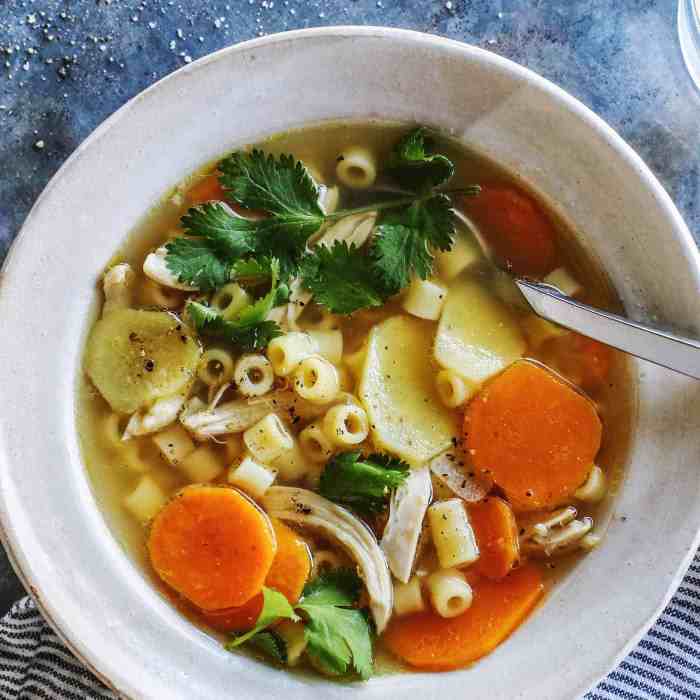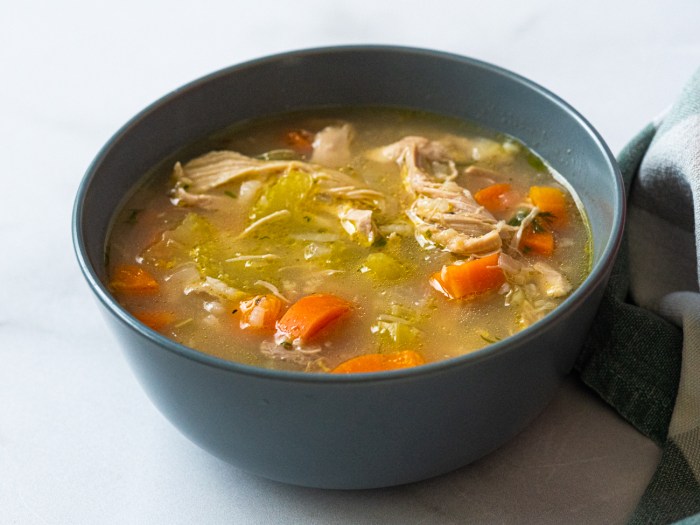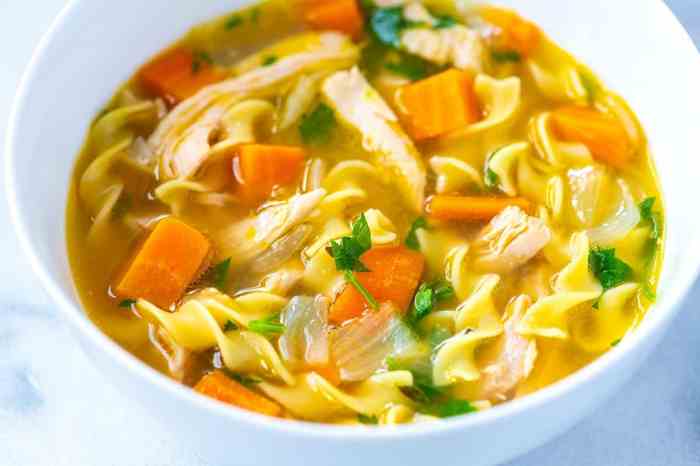The Comfort and Healing Power of Chicken Soup
Best chicken soup for a cold recipe – Chicken soup, a culinary staple across numerous cultures, transcends its role as a simple meal. Its enduring popularity as a remedy for colds and flu is rooted in both historical tradition and perceived health benefits. For generations, a warm bowl of chicken soup has been synonymous with comfort and healing, offering solace during times of illness.
Cultural Significance and Historical Context of Chicken Soup
The use of chicken soup as a remedy for ailments dates back centuries. Many cultures, including Jewish, Chinese, and European traditions, have long incorporated chicken soup into their folk medicine. Its presence in these diverse cultural practices highlights its widespread acceptance as a soothing and potentially therapeutic food. Historically, chicken soup’s perceived benefits stemmed from its easily digestible nature and ability to provide hydration and nourishment during illness, when appetite and energy levels often decline.
The belief in its healing properties is often passed down through generations, solidifying its place in cultural practices related to health and well-being.
Perceived Benefits Beyond Nutritional Value

Source: afarmgirlsdabbles.com
While the nutritional content of chicken soup undoubtedly contributes to its perceived benefits, many believe it offers more than just sustenance. The warmth of the broth is comforting, helping to soothe a sore throat. The steam can also help clear nasal passages. Furthermore, the act of consuming a nourishing and familiar food can provide a psychological boost, promoting a sense of well-being and easing the discomfort associated with illness.
Recipe Variations: A Culinary Exploration

Source: greatlifepublishing.net
The versatility of chicken soup allows for numerous variations, each offering unique flavors and textures. Below, we compare three distinct approaches: a classic version, a creamy alternative, and an Asian-inspired twist. Each recipe provides a slightly different culinary experience, catering to various tastes and preferences.
| Recipe Name | Key Ingredients | Cooking Method | Special Features |
|---|---|---|---|
| Classic Chicken Soup | Chicken, carrots, celery, onion, chicken broth, noodles, salt, pepper | Simmer chicken in broth, add vegetables, cook until tender, add noodles | Simple, familiar, customizable |
| Creamy Chicken Soup | Chicken, carrots, celery, onion, chicken broth, heavy cream, thyme, salt, pepper | Simmer chicken and vegetables, blend a portion for creaminess, stir in cream | Rich, decadent, comforting |
| Asian-Inspired Chicken Soup | Chicken, ginger, garlic, scallions, shiitake mushrooms, soy sauce, rice noodles, chicken broth | Sauté aromatics, add chicken and broth, simmer, add noodles and mushrooms | Savory, aromatic, flavorful |
Detailed Ingredient Breakdown and Cooking Methods
Each recipe variation offers opportunities for customization. For instance, in the classic version, you could substitute parsnips or turnips for carrots, or add different herbs like rosemary or parsley. The creamy version benefits from using high-quality cream and fresh thyme. The Asian-inspired soup allows for experimentation with different types of mushrooms or the addition of chili flakes for a spicier kick.
Cooking times will vary depending on the ingredients and the desired tenderness of the chicken and vegetables. Generally, simmering the chicken and vegetables until tender takes around 1-2 hours. Noodles or rice are added during the last few minutes of cooking.
Ingredient Spotlight: Nutritional Powerhouse
The effectiveness of chicken soup lies in the synergistic effects of its individual components. Each ingredient contributes to the overall nutritional profile and potential health benefits.
Nutritional Benefits of Chicken Broth and Vegetables, Best chicken soup for a cold recipe
Chicken broth is rich in electrolytes, which are crucial for hydration, particularly during illness. It also contains gelatin, which can soothe the digestive tract. The vegetables in chicken soup provide essential vitamins and minerals. Carrots are a good source of beta-carotene, celery offers fiber, and onions contain antioxidants. The combination of these nutrients contributes to overall health and immune function.
Importance of High-Quality Ingredients

Source: inspiredtaste.net
Using high-quality ingredients is paramount in achieving optimal flavor and nutritional value. Opt for free-range chicken for a richer broth and more tender meat. Fresh, seasonal vegetables will enhance both the taste and nutritional content of the soup. Similarly, using a good quality chicken broth, either homemade or store-bought, makes a significant difference in the final product.
Boosting the Recipe’s Efficacy: Enhancing Medicinal Qualities
Several additions can further enhance the medicinal properties and flavor profile of chicken soup.
Tips and Tricks for Maximizing Medicinal Qualities
Adding ingredients like ginger, garlic, and lemon can boost the immune-boosting properties of the soup. Ginger has anti-inflammatory effects, garlic possesses antimicrobial properties, and lemon provides vitamin C. These additions not only enhance the taste but also contribute to the overall health benefits.
Optional Ingredients to Enhance Flavor and Nutrition
- Fresh herbs (parsley, thyme, rosemary)
- Spices (turmeric, black pepper)
- Leafy greens (spinach, kale)
- Beans or lentils (for added protein)
Dietary Restrictions: Adapting the Recipe
Chicken soup can be easily adapted to accommodate various dietary restrictions.
- Vegetarian: Substitute chicken with vegetable broth and add hearty vegetables like mushrooms, potatoes, and beans.
- Vegan: Use vegetable broth, fortified with nutritional yeast for a cheesy flavor, and add a variety of vegetables and legumes.
- Gluten-free: Omit noodles or use gluten-free alternatives.
Serving and Storage: Maintaining Freshness and Flavor
Proper storage and reheating techniques are essential for preserving the quality and safety of leftover chicken soup.
Proper Storage and Reheating
Store leftover chicken soup in airtight containers in the refrigerator for up to 3-4 days. To reheat, gently warm it on the stovetop or in the microwave, avoiding boiling, which can compromise the flavor and texture. Avoid repeated freezing and thawing.
Serving Suggestions and Accompaniments
Serve chicken soup hot, garnished with fresh herbs, a squeeze of lemon, or a dollop of cream. Accompany it with crusty bread, crackers, or a side salad for a complete and satisfying meal.
Visual Guide: A Step-by-Step Description
While images would be helpful, the following text provides detailed descriptions of key steps in preparing the soup.
Preparing Chicken Broth from Scratch
Begin by rinsing the chicken and placing it in a large pot. Add water to cover the chicken completely, along with roughly chopped carrots, celery, and onion. Bring the mixture to a boil, then reduce heat and simmer for at least an hour, skimming off any foam that rises to the surface. The broth should become clear and flavorful as the chicken simmers.
After simmering, remove the chicken from the broth and let it cool slightly before shredding the meat.
Chopping Vegetables
Wash and peel carrots, celery, and onions. Cut the carrots into 1/2-inch thick slices or rounds. Chop the celery into 1/2-inch pieces. Dice the onions into small, roughly 1/4-inch pieces. Use a sharp knife for efficient and even chopping.
Consistent vegetable sizes ensure even cooking.
Visual Description of the Finished Soup
The finished chicken soup should have a clear, golden broth, punctuated by the vibrant colors of the vegetables. The shredded chicken adds a textural element, and the aroma is rich and savory, hinting at the herbs and spices used. The overall appearance should be inviting and appetizing, reflecting the quality of the ingredients and the care taken in its preparation.
FAQ Guide: Best Chicken Soup For A Cold Recipe
Can I freeze chicken soup?
Yes, chicken soup freezes well. Allow it to cool completely before storing in airtight containers for up to 3 months.
What if I don’t have all the vegetables listed in a recipe?
Finding the best chicken soup for a cold recipe often involves prioritizing comforting ingredients. For a lighter yet equally soothing option, consider exploring variations, perhaps incorporating elements from the many simple cream soup recipes available online; their creamy textures can be surprisingly effective. Returning to chicken soup, remember that a good broth and plenty of vegetables are key to its effectiveness.
Feel free to substitute vegetables based on availability and preference. Carrots, celery, and onions are common, but you can add others like potatoes, parsnips, or greens.
How long does homemade chicken soup last in the refrigerator?
Properly stored in an airtight container, homemade chicken soup will generally last for 3-4 days in the refrigerator.
Can I use bone-in or boneless chicken?
Both work! Bone-in chicken will yield a richer broth due to the marrow, but boneless is quicker and easier.
